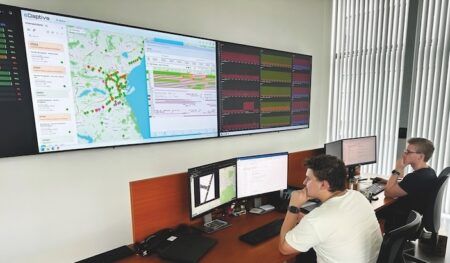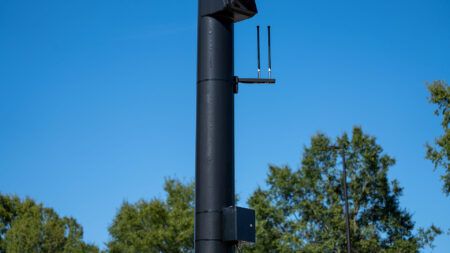Having won the US Department of Transportation’s (USDOT) Smart City Challenge, Columbus, Ohio, is now preparing to deploy the advanced transportation technologies that were featured in its competition proposal.
Netherlands-based connectivity specialists NXP Semiconductors NV, one of USDOT’s Challenge partners, has revealed that its highly advanced technologies for smart cities, including sophisticated vehicle communications systems, RFID tagging, and Smart Card ICs, played a key role in Columbus’s winning proposal.
The city will now use NXP solutions, including real-time vehicle-to-vehicle (V2V) and vehicle-to-infrastructure (V2I) communication systems, and secure public transportation smart cards for a more intelligent urban transportation system. NXP is working with Columbus to help deploy wireless technology, allowing cars to securely exchange data, prevent accidents and improve traffic flow, as well as Smart Card ICs to make secure public transportation access fast and easy for credit card and cash-based passengers alike.
NXP, together with partners Delphi and Siemens, has demonstrated vehicle-to-vehicle/infrastructure (V2X) technology at the Challenge announcement ceremony, where Columbus citizens were able to see the company’s RoadLINK V2X technology in action. Other NXP smart city technology to be deployed includes: Smart Card IC technology that enhances transportation for all citizens by supporting secure and convenient public transport ticketing and payment systems, including contactless transit fare equipment; and highly secure radio frequency identification (RFID) systems, such as vehicle window stickers that enhance driver convenience and reduce municipal costs by eliminating the need for stop-and-pay stations in public parking spaces.
“Technology like NXP’s will help bring Columbus’s vision to life, providing critical technology necessary for the development of America’s first truly smart city,” said US Transportation Secretary Anthony Foxx. “Smart transportation, identification and authentication solutions are essential components of creating ladders of opportunities; to build better transit and transportation systems for the future. These innovative technologies will allow cars to not only talk to each other to avoid accidents, but will also enable smarter infrastructure for the city itself, ensuring secure, connected experiences and smoother traffic flow for all Columbus’s residents.”
NXP’s president and CEO, Rick Clemmer, commented, “Columbus’s proposal outlined a clear and inspirational vision: to create a beautiful, healthy and prosperous community for all of its residents. In fact, this vision is exactly what our Smart Cities solutions are engineered to accomplish. We are proud that our secure, intelligent traffic management and smart public transport solutions play such a critical role in Columbus’s plans.
We sincerely congratulate Columbus for winning the Challenge, while also looking forward to working with the other six finalist communities, as they implement their own smart city plans in the future.”
Columbus Mayor Andrew J Ginther responded, “We are honored to win this competition and couldn’t be more excited to start deploying NXP’s innovative, leading-edge technologies to help create a safer, more streamlined city for all of our residents. With the help of great partners like NXP, we are on our way toward establishing Columbus as a worldwide model of what the future of cities can actually become.”




